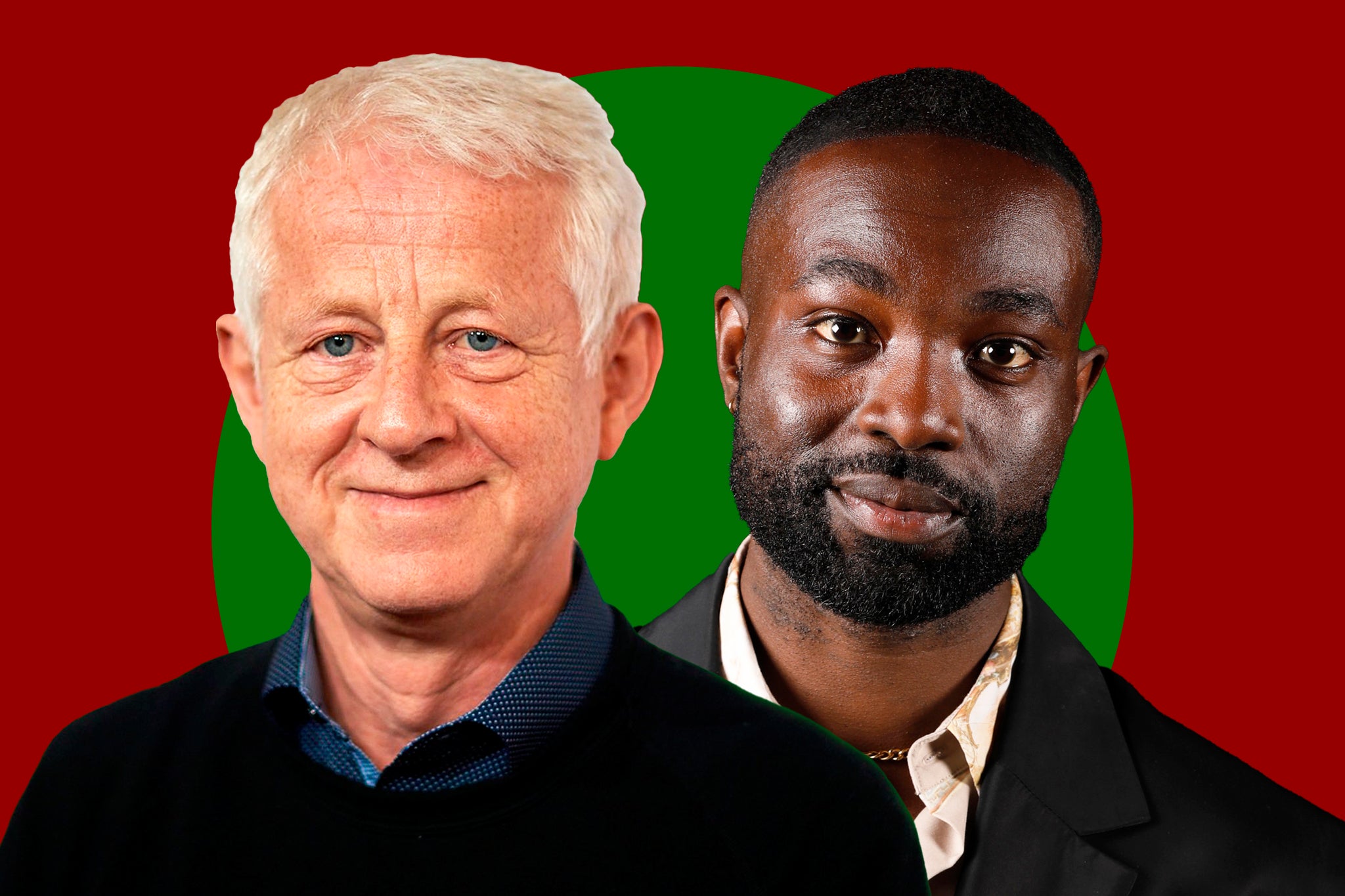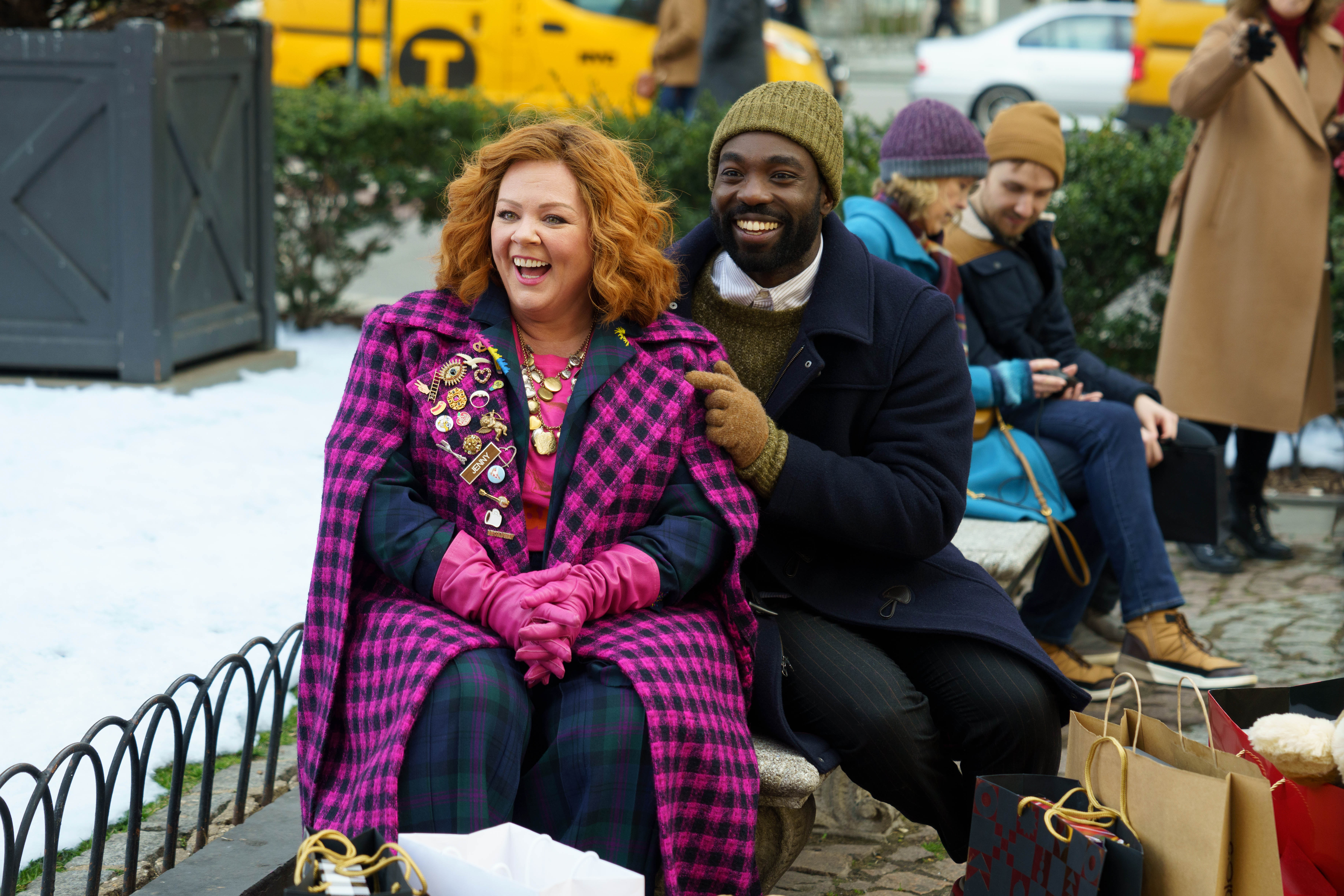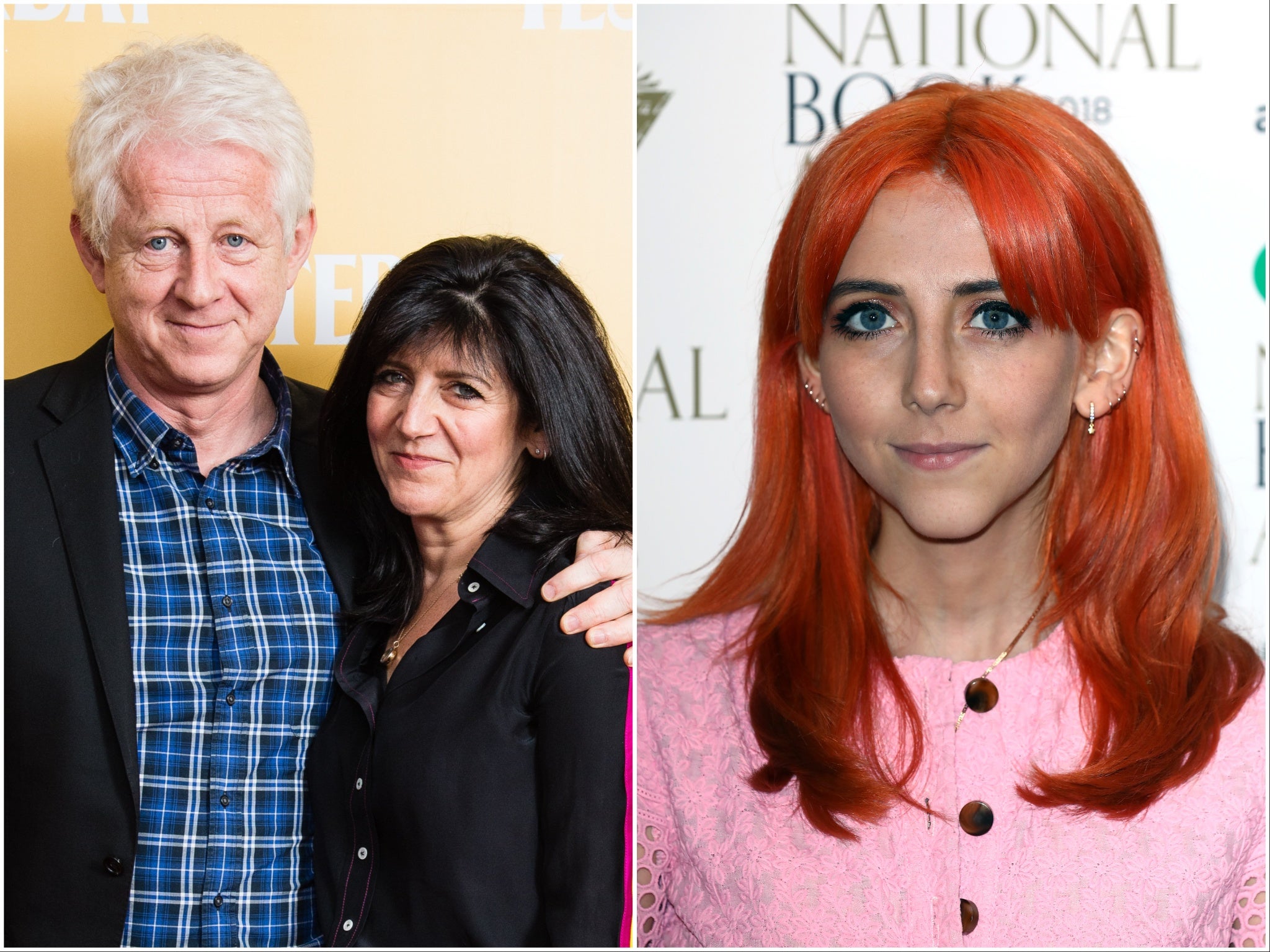Richard Curtis and Paapa Essiedu on Christmas, creepy scenes and romantic surprises: ‘In the corner, fuming with anger, was Hugh Grant’
The man behind ‘Love, Actually’ and ‘Notting Hill’ sits down with Paapa Essiedu, his new leading man in ‘Genie’, to talk to Ellie Harrison about his romcom back catalogue, their new festive family movie – and whether Curtis’s daughter would approve


Your support helps us to tell the story
From reproductive rights to climate change to Big Tech, The Independent is on the ground when the story is developing. Whether it's investigating the financials of Elon Musk's pro-Trump PAC or producing our latest documentary, 'The A Word', which shines a light on the American women fighting for reproductive rights, we know how important it is to parse out the facts from the messaging.
At such a critical moment in US history, we need reporters on the ground. Your donation allows us to keep sending journalists to speak to both sides of the story.
The Independent is trusted by Americans across the entire political spectrum. And unlike many other quality news outlets, we choose not to lock Americans out of our reporting and analysis with paywalls. We believe quality journalism should be available to everyone, paid for by those who can afford it.
Your support makes all the difference.About halfway through my conversation with Richard Curtis, the writer and director of Love Actually tells me the most Richard Curtis story I’ve ever heard. It was his 50th birthday, and his partner (now wife) Emma Freud had thrown him a surprise party in her office. (Curtis doesn’t like surprises – and had been promised there wouldn’t be any.) “As I walked towards the office, I saw Claudia Schiffer and a member of McFly entering the building, and I thought, I’m really screwed now,” the 67-year-old says. When he went inside, “there were all these people and, in the corner, fuming with anger, was Hugh Grant. Just wondering why the hell he was there.”
We’re on the subject of big, romantic gestures because, well, it’s Richard Curtis. The man who wrote the “I’m just a girl, standing in front of a boy” scene between Julia Roberts and Hugh Grant in Notting Hill. Who had Andie MacDowell and Grant (again) declaring their love for each other in the pouring rain, in Four Weddings and a Funeral. Who wrote the much-maligned Love Actually scene where Andrew Lincoln tells his best friend’s wife, played by Keira Knightley, “To me, you are perfect,” with a series of cue cards at her door. But more on that later.
There are also plenty of supersized romantic gestures in Curtis’s new Christmas film, Genie, starring I May Destroy You’s Paapa Essiedu as a workaholic Englishman in New York who, with the help of an eccentric wish-granter played by Melissa McCarthy, wins back his fed-up wife and daughter. Essiedu, 33 – who likes surprises – is as pleased as I am with Curtis’s 50th birthday anecdote. “The surprises in my life are very different to yours,” says the actor, who’s sitting beside him. “I don’t think I need to worry about Claudia Schiffer jumping out. And I feel like all your stories have Hugh Grant in the corner, fuming.”
The sheer popularity of Curtis’s films is perhaps to blame for him copping so much flak for the dodgy gender politics and overwhelming whiteness of Nineties and Noughties cinema, but in person, he comes across as a thoroughly lovely man, thoughtful and eager to reflect. He and Essiedu, who I meet in a tinsel-clad London hotel, have a warm rapport, constantly ribbing each other. “Fortunately, for the past five years, Hugh and I have managed to avoid each other,” jokes Curtis. “I won’t be talking about you like this, by the way, Paapa, in 10 years time.” “I don’t believe you!” comes Essiedu’s reply. They erupt into laughter.
Genie, in which Essiedu takes up the Richard-Curtis-leading-man-mantle from Grant and Colin Firth, is a lively remake of Curtis’s 1991 Christmas movie Bernard and the Genie. That film starred Alan Cumming as an out-of-work art dealer who inadvertently conjures Lenny Henry. In the new version, Cumming is the cruel boss of Essiedu’s Bernard, and McCarthy is the magical being from 2,000 years ago who crashes into contemporary Manhattan, pointy-toed shoes and all. It’s a typically wacky and infectious performance from McCarthy, whose genie is thrilled to discover the wonders of the modern world, such as pizza and Tom Cruise. She’s got no idea what a toilet is (she thinks it’s a hair-washing device) and assumes a thong is some kind of stretchy frisbee.
It’s Curtis’s first fully fledged Christmas movie since 2003’s Love Actually, but he “didn’t feel the weight of the past” upon him, he insists. In part, this is down to Genie’s setting, far from the rainy streets of London. “I’ve always wanted to have characters wandering through Times Square and to have the Empire State Building in the background. I once spent a Christmas in New York and did find it particularly jubilant.”

Filming in the city, says Essiedu, was “thrilling”. “On our first day of shooting, it snowed for real,” he says. “And I’ve always been a fan of the man [Curtis] and the work and Christmas movies, so it was on my bucket list to be involved in a central way.” Essiedu, who jokes that he’s going to put “Richard Curtis leading man” in his Twitter bio, brings all the earnestness and bumbling Britishness to the role that you’d hope, but much less grumpiness than his predecessors.
More than any of Curtis’s other films, Genie is a children’s movie: broad physical comedy, cuddly plotlines and no sharp edges. “Playing an innocent, benign central character is quite a tough thing, isn’t it?” Curtis says to Essiedu. “I think that Paapa got it right because, I remember saying to him one day, ‘In order to do this part, you’ve got to remove a fifth of your brain. You’ve got to have a kind of innocence, a kind of sweetness.’ We all know that if we bumped into a genie, we would immediately call the police, go to the doctor, all that kind of stuff, but having that open-eyed optimism, that almost Dickensian, David Copperfield kind of optimism, is a surprisingly complex thing to do.” Essiedu nods. “You’ve got to shed cynicism,” he agrees, “which I think is a bit of a crutch that we particularly lean on in this country. It’s easier, I think, in America.”
Time travel is clearly a preoccupation for Curtis. In Genie, Bernard wants to go back to a time before he pissed off his wife, so he can do things differently. In About Time, Curtis’s glorious 2013 sob-fest, Domhnall Gleeson can hop endlessly between different chapters in his life. “I think the older you get, the more you think about time travel,” says Curtis. “I do think about it quite a lot because when I used to celebrate Christmas, there were six members of my family, and now there are only three of us. I think about going back and spending more and different time with my sister and my parents.” Curtis’s parents have both passed away, and his sister Belinda died by suicide the day before her 55th birthday in 2009. In 2017, Curtis spoke about her death publicly for the first time at a Public Health England conference, calling for better resources for suicide prevention, saying that despite his family’s resources, “We had a 25-year stab at trying to help my sister and couldn’t do it.” Now, when he says “three of us”, he means him, his brother Jamie and sister Amanda. He’s also got four children with Freud, whom he married after 33 years in October.
“As your kids get older, you think, ‘Did I relish their youth enough?’” he says. “Because when you’re a parent, being a parent seems endless. It takes a long time for a year to go by, but suddenly” – he does a single clap – “they’re 18. And you think, ‘Did I go to the football matches? Did I take them out to enough movies?’ That’s what this movie is about – it’s easy to miss your kid’s childhood if you don’t watch out, because it appears as though they’re gonna be there forever.”
Curtis has also been thinking a lot about savouring his friendships. “I’ve got these wonderful things, and I’m just letting them slide by. I must do better,” he adds softly, almost as a note to himself.
On the subject of doing better, the filmmaker has been reappraising his romcoms in recent years. Love Actually is one of the many that has been put under the microscope for its fat jokes, everyday misogyny and lack of diversity. Curtis’s 28-year-old daughter, Scarlett, held her father to account at Cheltenham Literature Festival last month, noting the ways his back catalogue “in particular treated women and people of colour”. In Genie, by contrast, there are no gags about people’s weight, and it centres on a Black family. What does Scarlett make of it? “She hasn’t seen it, I hope she’s gonna love it,” says Curtis. “I’m surprised that anyone’s surprised that a writer would look back 10 or 20 years and say, ‘We live in a very different world.’ So I think she’s right on almost everything she says, and I hope that she’ll like it and that I’m making progress.”
There’s a big tradition of Christmas nasties. It’s peculiar. I think it’s lovely to watch happy films at Christmas
Curtis is changing his approach to casting. “Paapa’s in this film, and Himesh [Patel] was in the film before [Yesterday], and you’re just choosing now from a wider range of actors. And I’m sure those actors were there, as it were, but they weren’t on telly as much when I was young. So I do think that diversity, which should absolutely be part of the way that you think about life and the way that you portray people in movies, is one, important, and two, easier to do now.”
A huge part of the online discourse about Love Actually focuses on whether the scene with Lincoln and his cue cards is sweet and romantic, or just plain creepy. Curtis laughs incredulously as he recounts it. “He actually turns up, to his best friend’s house, to say to his best friend’s wife, on the off chance that she answers the door, ‘I love you.’” He shakes his head. “I think it’s a bit weird. I mean, I remember being taken by surprise about seven years ago, I was going to be interviewed by somebody and they said, ‘Of course, we’re mainly interested in the stalker scene,’ and I said, ‘What scene is that?’ And then I was, like, educated in it. All I can say is that a lot of intelligent people were involved in the film at the time, and we didn’t think it was a stalker scene.” He chuckles. “But if it’s interesting or funny for different reasons [now] then, you know, God bless our progressive world.”
One thing that will never change is Curtis’s belief that Christmas films should be uplifting. He did bring Bridget Jones’s Diary to the screen after all – and with it Mark Darcy’s eye-catching festive jumpers. He’s not a fan of Agatha Christie adaptations filled with stabbings and misery. “I do think that’s a bit odd, don’t you?” he says. “There’s a big tradition of Christmas nasties. It’s peculiar. I think it’s lovely to watch happy films at Christmas. I was absolutely raised on A Charlie Brown Christmas, and White Christmas was a particular favourite of ours when we were young, so I love being part of that tradition. I’ve written lots of Christmas specials of sitcoms, and I do think it’s a delight to watch something sweet after you’ve eaten that enormous meal.”

Both Curtis and Essiedu feel that bringing joy is especially important at the moment. “Obviously, we made the movie in a different political climate [to where we are now],” says Essiedu, “But I feel that the real creative and emotional thrust of this movie is to capture a spirit of something that is positive and warm and full of heart, at a time where, really, we want to be thinking about community and family.”
“I’ve always believed that, in the face of all the world’s many woes, there’s no contradiction in trying to do joyful things,” says Curtis. “If everybody who did do good things was disarmed by how hard the world is, then the world would be the poorer for it. That’s the theory of Comic Relief [the charity Curtis set up with Lenny Henry in 1985], which tries to solve the world’s problems by actually doing slightly reckless and irresponsible things. So I’m very in favour of positivity. Weirdly, one of the most popular TV programmes in some of the poorest countries in the world is Mr Bean [made by Curtis and Rowan Atkinson], and I think that’s so odd, but I love the idea that that just brings people simple pleasure.”
He really is the king of Christmas. At this point, I’m practically ready to start reciting Grant’s “love really is all around” airport monologue.
“One of the great jobs that we, as writers and actors can do, is make people happy,” he says. “There’s another massive job, which is making people aware of life’s complexities and understand the things that are hard, and understand other people and their emotions better.” He glances over at Essiedu. “But I think we can do both jobs.”
‘Genie’ is released on 1 December on Sky Cinema and Now
Curtis’s new show ‘Christmas Actually’ is at the Southbank Centre’s Royal Festival Hall from 7-11 December. For tickets, visit this link
Join our commenting forum
Join thought-provoking conversations, follow other Independent readers and see their replies
Comments